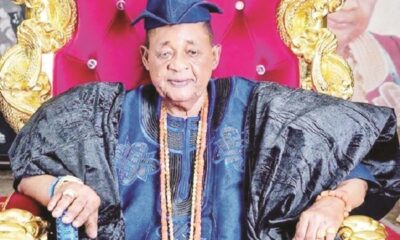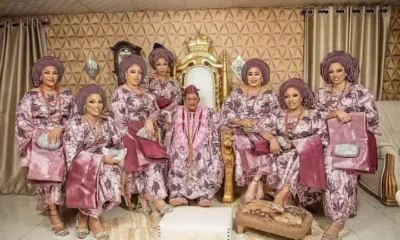The 44th Alaafin of Oyo, Oba Lamidi Olayiwola Adeyemi Alowolodu III lived an extraordinary life with panache and dedicated to battles and victories in many fronts. He joined his ancestors on Friday, April 22, 2022.
The maverick monarch was 83 and ruled for nearly 52 years, making him the longest of any Alaafin in modern history.
He thrived against adversities that marked his way from childhood, survived storms, and championed the culture and tradition of the Yoruba.
Many people in Oyo trembled at the thought, mention, or sight of the monarch. In most parts of Oyo, no event started without “E see Kabiesi fun Alaafin (Hail the Alaafin, whom nobody dares question) and most social and occupational associations had his photograph on their souvenirs. Alaafin Adeyemi was Oyo and Oyo was Alaafin Adeyemi.
A holder of the national honour of Commander of the Federal Republic and Chancellor of the University of Maiduguri until his transition, the Alaafin was an extraordinary man, a god-like figure with several myths surrounding his persona.
Young kids born to Alaafin-awestruck parents in Oyo were told he was a spiritual being, who would turn himself to pieces before he slept at night. Others, including adults, believed he had supernatural powers to listen when people spoke ill of him even in their bedrooms far away from the palace.
So, it was common to hear Oyo people say “N ko je pe ori Alaafin ni aida o (I am not wishing Alaafin bad)” and his panegyrists would sing “ti a ba bu leyin yii o si gbo o, abe ti lu kaara… (if you dare speak ill of him in
his absence, he would hear, he has his ears connected everywhere…).”
So, the news of his transition was unbelievable. He was immortal, many believed. More so, a vast number of people in Oyo had never witnessed the transition of an Alaafin. Before last Friday, the last time such happened was 54 years ago, 1968, when Alaafin Adeyemi’s predecessor, Alaafin Bello Gbadegesin Ladigbolu II, passed away.
But it did happen – Alaafin Adeyemi reluctantly has gone to Baara, as a stanza in his panegyrics goes:
Kìnìún òkè Àkẹ̀sán (The lion of Akesan hill)
Abi orí ẹṣin báábá lọ́nà kọ̀mu (Like the wanton horse’s head along Komu)
Abi ìrìn ẹṣin tìkọ̀-tìkọ̀ lọ́nà bààrà (Like the horse walks sluggishly along Baara)
(Burial rituals for the Alaafins are performed at Baara but a place within the palace is actually their resting home.)
Olayiwola omo Ibironke, Omo Adeniran, oro Omo Atiba
Alaafin Adeyemi III was born in Oyo on October 15, 1938, in the twilight of the reign of Alaafin Siyanbola Ladigbolu I (1911-1944), who lit the first torch of modernity in Oyo.
His mother was Olori Ibironke and his father, Alaafin Adeniran Alabi Adeyemi II (1945-1955), the son of Aremo Adelakun and grandson of Alaafin Adeyemi Alowolodu I (1876-1905), the last ruler of Independent Oyo, who ruled during the Kiriji War and signed the July 1888 Treaty with the Queen of Great Britain and Ireland as “King and Head of Yorubaland”.
Alaafin Adeyemi I’s father and Alaafin Adeyemi III’s great-great-grandfather was Alaafin Abiodun Atiba who founded the present Oyo in 1837 following the destruction of Oyo Ile, the capital of the Old Oyo Empire, by the Fulani.
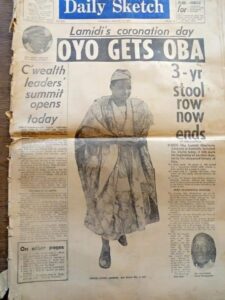
Atiba, according to Oyo royal historians, actively worked against the rebuilding of Oyo Ile because he had had divination that it was fated to collapse. He focused on creating a new kingdom in the present Oyo where there were then existing settlements, including Ago Oja. To consolidate, he offered the title of Ashipa to the Oja family (at present-day Isale Oyo) by whose side the Alaafin palace sits to date. That was the genesis of an enduring history of tensions and confrontations, which became the main battle Alaafin Adeyemi III fought for most of his reign.
But his life battles started in his early years. Although born into royalty, he barely experienced the sublimity attached to such birth as a child, and perhaps forever! He was in Iseyin for Quranic education and later sent to live with the Alake of Egbaland, Adedapo Ademola.
It is said that his father was enriching him with the required ingredients of tough adulthood, which he perhaps had foreseen. The young Lamidi was in Abeokuta until 1948 when his godfather, Alake Ademola, abdicated the throne following a series of protests over taxes by Egba women, most notably led by Funmilayo Ransome-Kuti, the mother of Afrobeat legend, Fela. That event truncated his education in Abeokuta.
But instead of returning home, he was sent to live with Kofo Abayomi, a popular nationalist and medical practitioner, in Lagos where he attended St. Gregory’s College on Lagos Island. It was in Lagos that he became a boxer, which he said helped shape his character.
He did not attend a university. Though he said he was supposed to go study for a law degree in London, the demise of his father hurt his academic plan. Yet his erudition was profound. He was encyclopedic in his knowledge of history, and he displayed that much in his various interventions, especially on chieftaincy and historical matters across Yorubaland.
“Orisa ti o ba buru Oyo o ni sin (Oyo does not worship a deity that is not brutal)”
In addition to his experience in Abeokuta, another development would offer a background to his ruthless methods against real or perceived threats, even if a mere poor aide.
His father, Alaafin Adeyemi II, more popularly called Alaafin Adeniran, was deposed in 1954-55 by the Obafemi Awolowo-led Action Group (AG) government of the Western Region in what was apparently politically motivated. Alaafin Adeniran was a sympathiser of an opposition party, NCNC, and had clashed with AG deputy leader Bode Thomas, who eventually died in a controversial circumstance.
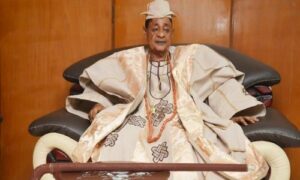
Violent confrontations started in Oyo between NCNC and AG supporters and claimed five lives on September 5, 1954. That created an opening to deal with Alaafin Adeniran and an investigation led by R.E.Lloyds, a crown counsel in the ministry of justice in the Western Region, opened. While the inquiry was ongoing, Alaafin Adeniran had been forced to exile in Ilesha and was living in the private home of the then Owa Obokun of Ijeshaland, Haastrup Ajimoko.
In a 2017 interview, published online, with Bode Durojaiye, who later became his media aide, Alaafin Adeyemi III said the AG government targeted his father despite having already convicted and condemned five NCNC members to death by hanging. He said, nevertheless, Lloyds’ panel dismissed all the “trumped-up” charges against his father and recommended he be allowed to return to his throne.
In that interview Alaafin Adeyemi III said:
“The Government of the Western Region through its Attorney-General and Minister of Justice, Chief F.R.A. Williams, refused to publish the report of the panel of Inquiry but rather rejected the report in its entirety. The government instead came out with its own white paper. It deposed and banished from Oyo and its provinces Oba Adeyemi 11, the Alaafin of Oyo. The government stated that the banishment became necessary for peace and good governance in the Western Region. Earlier on, Oba Adeyemi’s first son and the Aremo of Oyo, Prince Tiamiyu Adebayo Adeyemi had also been banished from Oyo and was accommodated by the Ojora chieftaincy of Apapa Lagos, while he died in Lagos in 1956 and his father was still in Ilesa.”
He said the government moved his father to Lagos to live in a “mosquito and snake-infested Lekki peninsula area of Lagos with a cook, a steward, and a little stipend were provided. These conditions were too demeaning for the monarch and his supporters to swallow. A wealthy merchant of Yoruba extraction from Cotonou based at Oke-Aarin of Lagos Island, Alhaji Nurudeen Soule Badru, came to the Oba’s rescue. The hope that the Alaafin, Oba Adeyemi 1, would return home was dashed with the announcement of the selection of a new Alaafin of Oyo in the person of Late Oba Bello Gbadegesin in 1956.”
He considered the suffering of his father a historical injustice, an act of wickedness, and he had to be ruthless against any perceived threat to prevent that from befalling him. He must present a fearsome persona. His
panegyrists sang terrifying praises and he must crush his enemies to deter future ones. The energy he deployed to fight a tiger was exactly what he would use against a mere rat. He ended up hurting many people, who never contributed to the fall of his father and fought a number of others, who had supported his ascension.
Ma ran oro o (Do not pursue vengeance)
Then 32-year-old Lamidi Adeyemi was made the Alaafin in 1970 but his coronation ceremony was held on January 14, 1971, when he was given the staff of office by the Military Governor of the old Western Region, Adeyinka Adebayo, a major-general.
His ascension followed a stiff competition, but he was backed by the supporters and associates of his father to emerge victorious. At the time, he was working in the role of an insurance clerk at Royal Exchange Assurance in Lagos.
But his ascension had been prophesied. One man, Baba Alabi Oyo, who was an aide of Alaafin’s benefactor and backer, Emmanuel Ashamu, a prosperous businessman, once said a Celestial Church priest told Mr. Ashamu not to allow the young Lamidi to carry his purse again because he was going to be a king. The priest reportedly told Mr. Ashamu that he must deploy his resources to help the young Lamidi against other contenders whenever it was time. That happened.
His coronation was a grand ceremony as never seen before. The common song was: ‘Adeyemi ti j’Oba, ara Oyo e f’okan ba’le owo de (As Adeyemi emerges king, the people of Oyo rest assured prosperity has come).’
He once said the Oyo Mesi counselled him and warned him against vengeance. Although the disgraceful deposition and suffering of his father remained a subject of grievance for him and he continued to say it while he lived, he brought back to Oyo Central Mosque the supporters of his father, who had left for Pakoyi Mosque, thereby trying to unite a divided community. Oyo people would tell if he sought vengeance.
While he reigned, he faced multiple allegations of murder and serial rights abuses, including involvement in the 1992 assassination of the Ashipa of Oyo, Amuda Olohunosebi. The Alaafin was never charged but the police investigation linked him with the suspects. The police said the trio of Alaafin and the two suspects charged, Biodun Faseyitan and Segun Oduneye, travelled to London and came back with the vehicle used to carry out the Asipa’s murder and that the latter had obtained a UK visa with the fake identity of “Kayode Adeyemi”, presenting himself as a son of Alaafin.
Mr. Faseyitan was discharged by the court but Mr. Oduneye was convicted and jailed for conspiracy based on the passport he had obtained with a fake identity and which was discovered in his residence during a police search. The Olohunosebi family tried to have the government reopen the case because the Alaafin was not charged despite the police investigation report linking him with the suspects. That never happened.
In December 2014, the Federal High Court in Ibadan granted an order of mandamus asking the Inspector General of Police to investigate the Alaafin for alleged murder and human rights abuses. Nothing ever came out of that. His erstwhile godson, Kamil Akinlabi, with whom he fought one of his most dramatic battles, was believed to have motivated the plaintiffs, who approached the court for an order to investigate the Oyo monarch for crimes.
After the assassination of the Ashipa, his people in Isale Oyo, who were descendants of Oja, engaged in open violent confrontations with the Alaafin, rebelled, and declared they were no longer taking the Ashipa title.
Instead, they sought to create an autonomous chiefdom – Ago Oja with the head being Alago Oja – for themselves. Late Adebayo Alao-Akala, then governor of Oyo State, granted their request, setting him on a collision course with the Alaafin. He lost his re-election bid and later said he lived to regret he had offended the Alaafin, who principally mobilised support for Abiola Ajimobi, Mr Alao-Akala’s successor.
Alaafin continued to battle in courts to prevent the success of Ago Oja autonomous chiefdom ambition.
Another storm he survived was the case of the assassination of an Oyo activist, Rasheed Atingisi. Mr. Atingisi made it to the University College Hospital, Ibadan and wrote a statement in his own handwriting naming one of the “palace boys” – Mojeed Agbaje, popularly called Tobalase, a private security aide of the Alaafin – as the man that shot him. Mr. Atingisi died about 24 hours after his written statement. The police arrested the alleged gunman and charged him in court with murder. But on the ground of no corroborative witnesses and since the shooting happened at night, the accused was discharged and acquitted. It was a victory for the Alaafin.
Meanwhile, the accused, Mr. Agbaje, who later became estranged from the Alaafin, later said in a video clip posted on YouTube that the Oyo monarch instructed him to carry out nefarious activities, including murder. On March 14, 2014, Mr. Agbaje deposed to an affidavit at the High Court of Oyo State in Ibadan, confirming the contents of the video.
SSS, Police suspicions
The Nigeria police also suspected the Alaafin of other criminal activities.
A police memo, dated September 19, 2009, from the Oyo State Commissioner of Police at the time to the Oyo Area Command, directed: “arrest the situation before it is too late because the Alaafin intends to bomb the ancient city of Oyo.”
According to the document, some of the places the Alaafin allegedly planned to bomb during the 2009 Islamic Eid Kabir festival included Oloja’s palace and Isale Oyo praying ground, Sabo; Bizinillahi Estate, and Unique Hotel where Elepe Iseke (a chief that the monarch was feuding with) lived.
The police said the suspected move of the Alaafin was revealed to it by top members of the Tobalase group.
A report by the State Security Services claimed the Tobalase group was founded by the Alaafin “originally to oust the Baale Ago Oja, hence the location of their base contiguous to both Ashipa’s residence and the market of Isale-Oyo. The group has included in their activities, harassment and intimidation of perceived enemies of the monarch within the three (3) LGAs
in Oyo.”
A man of his people, a doting father
Beneath the fearsome persona was a man, who was shy, humble, and warm. He had his insecurities, especially fears that enemies were constantly lurking around, and like Okonkwo in Things Fall Apart, he believed he must not portray an external presentation of gentleness. And even when he was merry-making, he prized songs and eulogies that told the public of his strengths and capacity for brutal plots.
But in his private realm, he was a doting father, who was fond of his children and grandchildren and sat in convivial moments with his extended family members, especially females called “Olomobas” who made his palace their home and office while he reigned. Despite living a life of battles, he enjoyed his life, married many wives and fathered many children, and often danced in the midst of ordinary Oyo people, who admired and feared him.
He would organise small parties and photoshoots in his palace for any of his children graduating with top honours.
Alaafin valued talents, especially creative writers and thinkers. Many times when he travelled to Ibadan, he was in his quarters to keep appointments with young writers for intellectual firework, those close to him said.
And he certainly left Oyo bigger and more modern than he met it. He was a sports lover. He had a football club, Adeyemi Babes, now defunct, and he granted access to his palace for evening soccer exercises and competitions many years ago.
The champion of the people, the man of culture and extraordinary courage
Alaafin was remarkably royal and graceful in appearance and a delight to watch when he spoke or displayed his elegant traditional dancing prowess. He would to his drummers his preferred beats and songs, all philosophical and a reflection of historical occurrences.
His favourite song was:
Riran ni won ran mi waa (I was sent on a mission)
Emi ki ni mo ran ara mi o (I did not send myself)
Ase mi do eni t’o ran mi (My command is my sender’s)
He epitomised the culture and tradition of the Yoruba and stayed committed to the traditional religion, carefully ensuring the e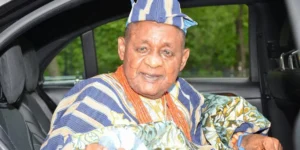 ffects of modernity did not erode the culture and tradition of his people. He declared that was the bond he had with his ancestors and of course, his life purpose.
ffects of modernity did not erode the culture and tradition of his people. He declared that was the bond he had with his ancestors and of course, his life purpose.
He was a repository of Yoruba traditional history and made several interventions to resist distortion of history, especially regarding chieftaincy matters and when the place of the Alaafin institution in Yoruba history was challenged. Even many Yoruba people, who would wish he was gentler, credited him for his defence of culture and tradition. The Yoruba may have lost the last of their cultural heroes.
He was extraordinarily courageous. He offered himself as a champion of his people. He was loud against threats of insecurity, openly decrying the failure of the Federal Government to protect the Yoruba people against violent Fulani herders and warned of a resort to self-help.
He was a mortal. He fought battles, most times conquering. He was intentionally tough and brutal, apparently due to his experience, which shaped his insecurities and determination to prevent the injustice and difficulties his father suffered from befallen him. But many of his harshest critics will agree he delivered on his original role as a traditional ruler and custodian of the culture and tradition of his people.
CULLED FROM PREMIUM TIMES

 News3 years ago
News3 years ago
 Entertainment2 years ago
Entertainment2 years ago
 News3 years ago
News3 years ago
 Privacy3 years ago
Privacy3 years ago
 Sports2 years ago
Sports2 years ago
 Entertainment2 years ago
Entertainment2 years ago
 News3 years ago
News3 years ago
 Opinion3 years ago
Opinion3 years ago
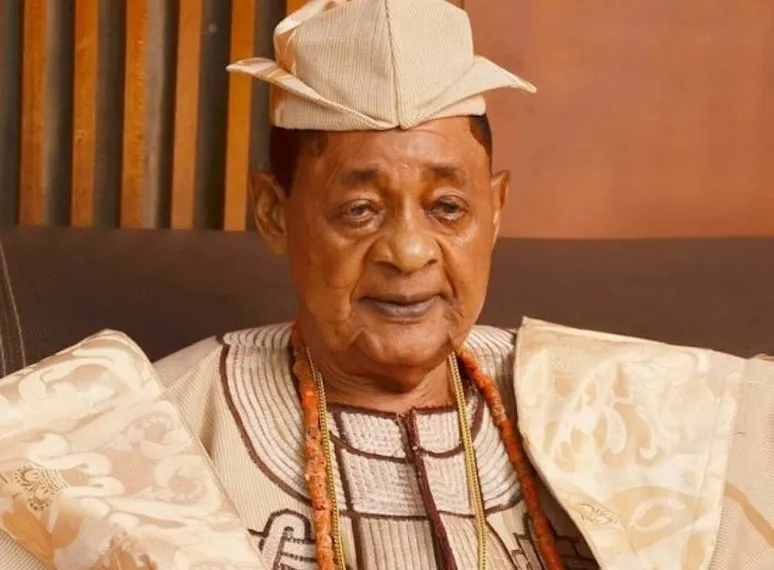


 ffects of modernity did not erode the culture and tradition of his people. He declared that was the bond he had with his ancestors and of course, his life purpose.
ffects of modernity did not erode the culture and tradition of his people. He declared that was the bond he had with his ancestors and of course, his life purpose.



